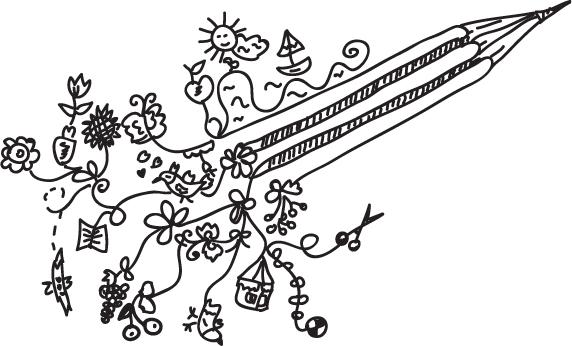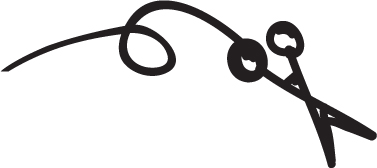

You just finished your article on the World Series for Sports Illustrated, and now you have to dash over to the library to read a passage from your new book, Another Perfect Storm, to a group of young would-be writers. Then you have to start writing a column for Seventeen, profiling that hot new band. And somewhere in there you must find time to start working on that new mystery you have been carrying around in your head.
If you decide that you want be a writer and earn a living at it, be prepared . . . your parents’ first reactions may include at least one of the following worries:
• You, their precious child, will wind up starving in a garret (garret is the fancy word people use for an artist’s room in the attic).
• You will become famous and weird like Ernest Hemingway and go on dangerous adventures and keep lots of six-toed cats for company.
• You will become even flakier and more out of it than you already are.
• You will start wearing a black beret, spending your nights at smoky poetry readings, and snapping your fingers instead of clapping.
• You will write embarrassing things about your family and friends!
A good way to keep your parents calm and on your side is to tell them that you are already taking this writing thing seriously. In fact, you’re even researching how to be a successful writer by reading this book! Go ahead and ask your parents for help every now and then—get their story ideas, comments on your writing, proofreading help, and advice on any contracts you get. This is a double whammy: it gets them involved and excited about your writing career and also gives you free help.
If you have discovered that writing is your passion, you’re in luck, because there are more cool and exciting writing careers than you can count. But how can you find out which ones you’d like best?
1. Don’t be shy about talking to a teacher or librarian about being a writer. Good teachers live to help kids in real ways. Tell them how you’ve become interested in writing and ask if they can help you find good writing contests or publishing opportunities. You could also ask them to help you choose your best piece to send out.
2. If your school has a newspaper or a literary magazine, get involved.
3. Write, email, or call your local newspaper and ask if they accept freelance writing—stories written by people who aren’t on their newspaper staff. You may be surprised at the answers you get.
4. If you are interested in writing for TV, cable TV is a good place to learn about it. Many cable companies provide opportunities for kids to get involved in working at a real TV station: you can learn how to run cameras, editing equipment, and even how to write the shows. Check with your school about local cable TV stations and whether or not they accept student interns.
5. Do an internship at a book publishing company, a magazine, or a newspaper. Check your phone book or ask a teacher about companies in your area, then call and ask if they would be interested in having a student intern. Be sure to tell them how hardworking and passionate about writing you are. This is a great way to see behind the scenes of publishing.
6. If you want to write plays or movies, volunteer at a local theater. Even if you’re not into acting, there are plenty of other theater jobs that will help you learn how to write for the stage (or the big screen).
7. Read biographies of real writers to learn what their lives are/were like and how they got started. Get inspired!
8. Write to your favorite author or call a local writer and ask for their advice. Two young writers we know wrote letters to the author Nathaniel Philbrick and got handwritten replies explaining all about how he researched his book In the Heart of the Sea. Most authors really enjoy talking with young people about writing. After all, they had to start out once too. But it may take them a while to get back to you, so be patient and don’t get discouraged.
9. Go to writing conferences. You can find some of these listed in market directories mentioned in the chapter on resources. Also, your teacher may be able to tell you about conferences specifically for young authors. Or you can visit the website for the Society of Children’s Book Writers and Illustrators (SCBWI) at scbwi.org.
10. Start your own writing group. You can work with one person or a few, and your group members don’t necessarily need to be local—you can meet regularly through the internet.

I think screenwriting is the most fun kind of writing to do. You get to imagine a movie in your head and write it down. It’s mostly action and talking, without much description. And when they shoot the film, it’s even more fun to see the movie from your imagination become a real movie that everyone can see.
—Cynthia Whitcomb
screenwriter and winner of the Christopher Award for her screenplay When You Remember Me
I like writing poetry because things occur to me while doing it, things that wouldn’t have occurred to me doing something else. Poetry is condensed language, and just like condensed orange juice right out of the can (before the water is added) is a stronger version of the juice you drink, poetry is a stronger, more potent version of everyday language. Poems make the reader re-experience something in a powerful way.
—Michael Strelow
published poet and English professor
Writing for TV is very different from writing for print. For one thing, you have to learn to write “for time”—your words have to fit the pictures in the story! I wrote for the evening news and I loved working on deadline. I also liked that every day was different. Nobody cares about yesterday’s news, so you are always writing about something new.
—Vicki Hambleton
formerly a TV news writer for more than ten years

I enjoy editing because I love decision making. I like making the choices—you are confronted with an array of possible stories and an array of possible photographs, covers . . . I love all the ingredients that go into making the magazine and putting all the pieces together. After making lots of decisions week after week as an editor, it’s wonderful to take three or four weeks and dive deep into some other kind of subject and come out with a big story that may be on the cover of Time.
—Claudia Wallis
magazine editor and writer
I find it amazing that I actually get paid to talk with people I find so interesting. It’s fun to share stories with young readers about the people they are most interested in. My job is filled with variety and fun.
—Janis Campbell
newspaper feature writer for kids
When I am writing, even though I am alone in a room, my characters keep me company. This is one reason I like to write plays: I’m never lonely. I also love to spend time around other playwrights, as well as actors, directors, and designers. Playwriting suits me because it is the perfect combination of intense solitude (while I write the play) and concentrated periods of sociability (rehearsals and performances). I have stories to tell; I have worlds to invent; I have people to create. I can’t think of anything else I’d rather do.
—Bridget Carpenter
author of many plays, including Fall, which won the Susan Smith Blackburn Prize in 2000
While I was a librarian, I started thinking it would be neat to write a book. My friend Marcia and I started talking about books we liked and ones we didn’t like and said, “Oh, it would be easy to do that.” So the next day, we sat down for twenty minutes during our lunch break—we would eat our lunches and write at the same time. About a year and a half later, we had our first book published. I love writing for kids.
—Debbie Dadey
author of more than sixty books, including the Adventures of the Bailey School Kids series

They say necessity is the mother of invention. That also applies to the birth of my freelance career. I was about to be a single mother and writing was all I knew how to do. But sending my babies off to daycare seemed like cutting off my right arm without anesthetic. So . . . I became a freelance writer. Luckily, a WORKING freelance writer. I started writing primarily (80 percent) for children’s markets. Now it’s about 50/50 children’s/adult markets. I love my job because of the vast flexibility of subject matter. It’s as if I’m always learning, always taking new steps forward, intellectually. The “Freelance University” offers one of the best and most diverse educations on the planet.
—Kelly Milner Halls
freelance writer
Here’s a list of different careers that you might want to think about:
Novelist
Sports writer
News writer for TV or radio
Foreign correspondent
Freelance writer
Editor
Fashion reporter
Medical writer
Technical writer
Screenwriter
Playwright
Children’s writer
Speechwriter
Blogger
These are just some of the careers open to writers—there are many more. If you know a writer whom you admire, don’t be afraid to get in touch with him or her. Ask them what they like about their job and how they got started. Many writers enjoy talking to aspiring authors and giving them encouragement. Partly that’s because most writers really love what they do. There is nothing better than doing something that makes you feel happy and fulfilled (okay, and TALENTED) . . . and maybe someday even makes you rich and famous. Like anything else, a writing career takes work, but if you follow the examples in this book, you’ll be well on your way to any writing career you choose!
For many careers you need years of training, but the great thing about being a writer is that you can do it at any age. You don’t have to finish college or pass a bunch of tests before you can start. You can also change your form, style, and the market for your writing as often as you like. If you start out writing sci-fi/fantasy, you are not stuck with it for life—there are plenty of other genres out there! And if you start out writing magazine articles, you can easily move on to writing novels too. The more you live and have different experiences, the more you will have to write about!
You’re humming to yourself on the school bus, of all places, and your cheeks kind of hurt from all that smiling. You can’t wait to get home and get this into your journal—and maybe try a new writing prompt too. It was pretty amazing today when Mrs. Crabapple gave out copies of this month’s Teen Ink in English and your short story was in it. There it was, your writing, and there was your name, in print. The whole class cheered. You know that not only do you want be a writer—you are a writer!
So, you want be a writer? Go for it! Look over this book and start anywhere you want—set up your writing space, get yourself a journal, try a new writing prompt, order a book, start a writing group, read a magazine with writing by young authors—these things that real writers do, and lots more, are right here for you. We said in the first chapter that, if you like to write, you are one of the luckiest people in the world, and we meant it. It’s something you can do right now, do for the rest of your life, love every minute of—and even get paid for! See ya in print!